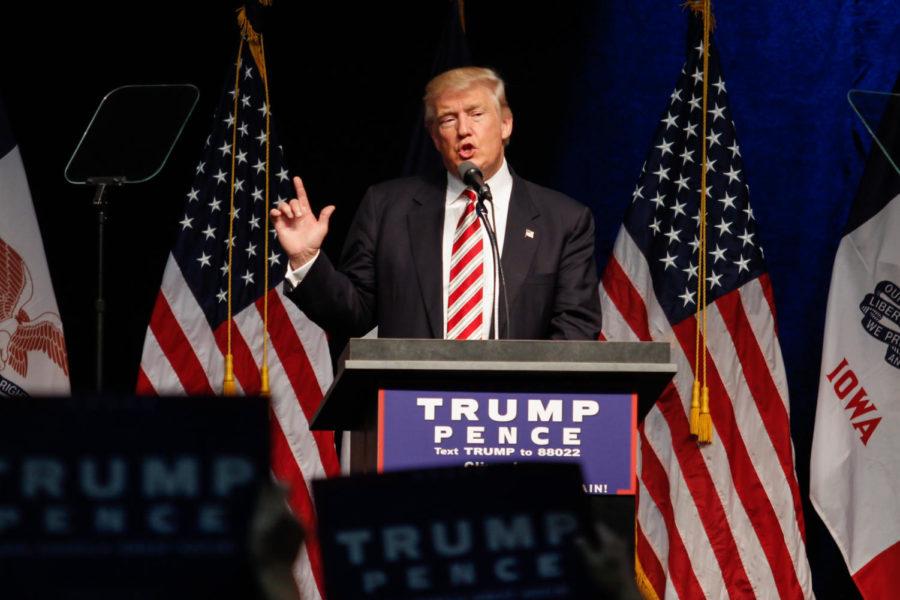Trump’s plan to end birthright citizenship met with strong opposition
Now-President Donald Trump speaks to the crowd about then-Democratic presidential nominee Hillary Clinton’s emails on Sep. 13, 2016 in Clive, Iowa.
November 1, 2018
President Donald Trump announced Tuesday that he is planning on ending birthright citizenship, a policy guaranteed under the 14th Amendment of the Constitution.
Birthright citizenship ensures that any person born on U.S. soil is considered a citizen of the United States.
“So-called Birthright Citizenship, which costs our Country billions of dollars and is very unfair to our citizens, will be ended one way or the other,” according to a tweet sent by Trump on Tuesday. “It is not covered by the 14th Amendment because of the words ‘subject to the jurisdiction thereof.’ Many legal scholars agree.”
This policy has been around since an 1898 Supreme Court decision, occuring around 30 years after the passage of the 14th Amendment.
Assistant Professor of Political Science David Andersen said this would be a broad overreach of the president’s powers.
“[The plan] is borderline absurd,” Andersen said. “We have a very clear system with the constitution where if we have any question about the meaning of the constitution it is the Supreme Court who interprets it for us, and they have already interpreted it for us.”
Andersen said even if Trump encouraged Congress to make a law ending it, it would almost certainly be stopped in court, but that isn’t what Trump has been asking.
The idea that an executive order could be used to change the interpretation of the constitution is an unprecedented move, Andersen said.
“That makes no sense whatsoever because if a president could do that then the constitution would not be the supreme document of the land,” Andersen said. “The president would be the supreme document of the land, and presidents could just use executive orders to change the constitution at their will.”
Members of the Republican party have also mentioned their issues with Trump’s plan. Most notably, House Majority Leader Paul Ryan, who is not running for re-election, said the idea was not within the president’s power.
In a radio interview, Ryan said an executive order like the one Trump is proposing would only be possible following a lengthy constitutional amendment process, which has not happened and is not in the process of happening currently.
“I believe in interpreting the Constitution as its written, and that means you can’t do something like this via executive order,” Ryan said.
Trump tweeted a response to Ryan shortly after the radio interview — six days before the midterm election.
“Paul Ryan should be focusing on holding the Majority rather than giving his opinions on Birthright Citizenship, something he knows nothing about!” according to Trump’s tweet. “Our new Republican Majority will work on this, Closing the Immigration Loopholes and Securing our Border!”
While the infighting between Ryan and Trump are happening days before the election, Andersen said the statements Trump has been making are for strictly political purposes, and that much of what he has been proposing is either impossible or overblown.
Andersen gave examples of Trump sending 5,000 troops to the southern border to defend against a caravan that “holds absolutely no threat to us and that he would pass a 10 percent tax for the middle class by November despite Congress not currently being in session.
“This fits very well into a pattern of behavior from the president lately of just suggesting doing rather absurd things that he knows his base will be excited about, and its kind of embarrassing that he is just trusting that his base is not smart enough to know that he is not serious,” Andersen said.
Trump has also made statements since Tuesday that the United States is the only country that has birthright citizenship. However, here are more than 30 other countries who have a system to grant automatic birthright citizenship, including U.S. neighbors like Canada and Mexico, according to a study from the Center for Immigration Studies.
The Center for Immigration Studies is often cited by Trump’s advisers as a group that typically supports policies restricting immigration.







